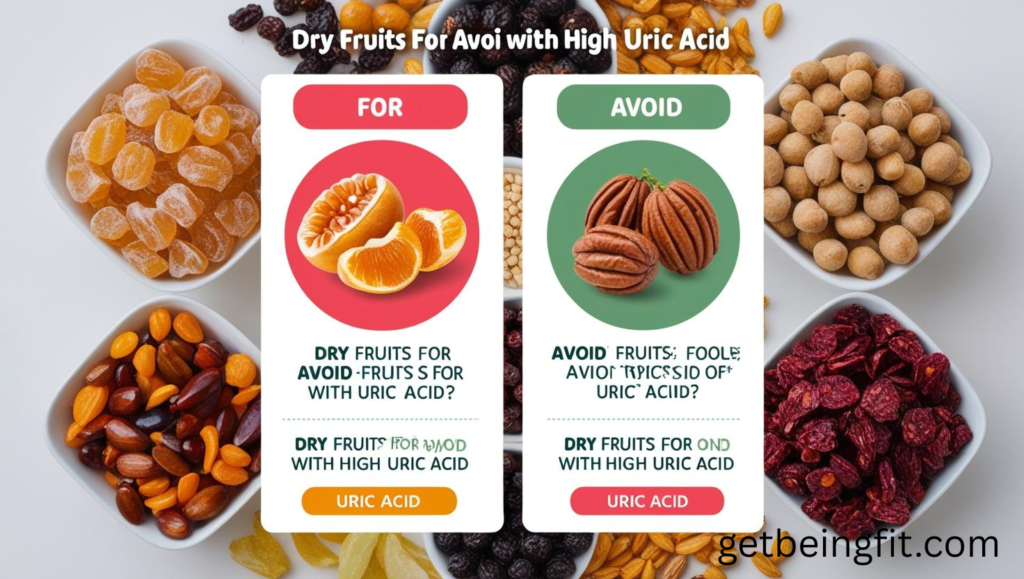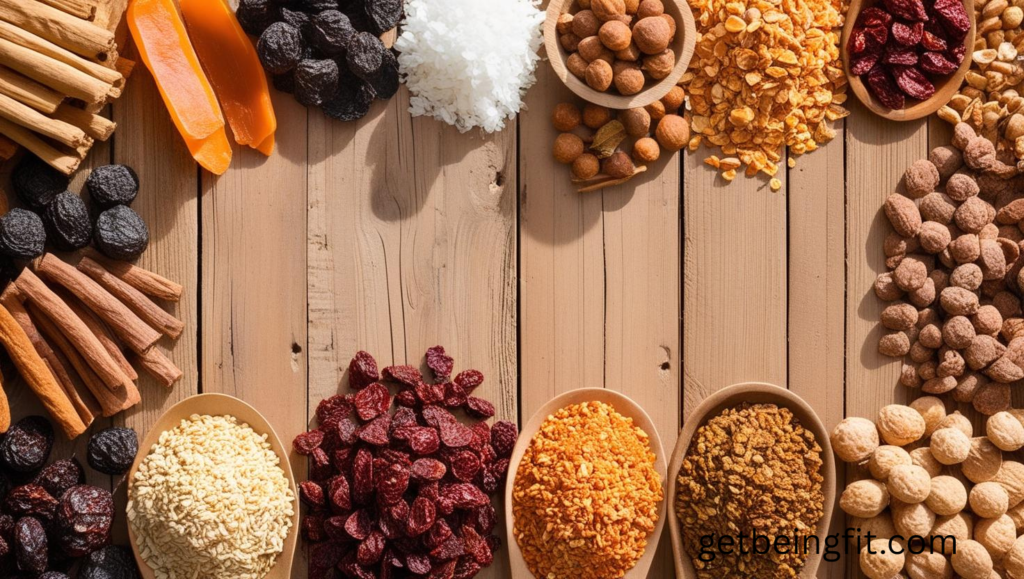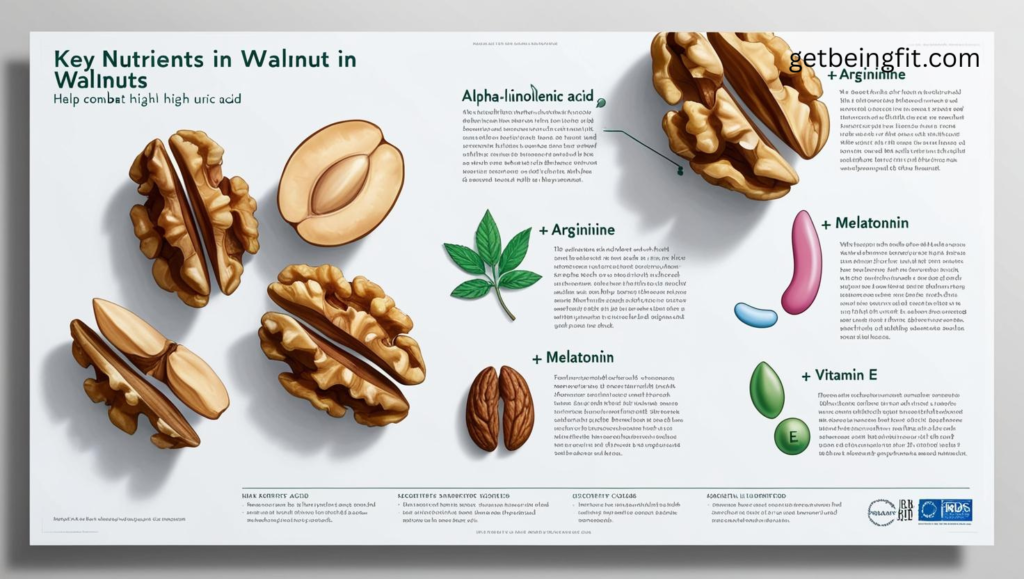10 BEST Dry Fruits for Uric Acid Control: Scientifically Proven to Reduce Gout & Inflammation
Discover the 10 best dry fruits for uric acid control that help manage gout naturally. Learn how to consume them for maximum benefits, backed by rese
“Fight gout naturally with these nutrient-packed dry fruits!”

Introduction
High uric acid levels can lead to painful conditions like gout, joint inflammation, and kidney stones. While medications help, diet plays a crucial role in managing uric acid. Among healthy food choices, certain dry fruits stand out for their ability to lower uric acid levels due to their anti-inflammatory and antioxidant properties.
In this article, we explore the top 10 dry fruits that help reduce high uric acid, how to consume them, and their scientific benefits.
National Institutes of Health (NIH)
Research from the NIH suggests that almonds help lower oxidative stress, reducing gout flare-ups.”

Why Dry Fruits Help in Reducing Uric Acid?
Dry fruits are rich in fiber, vitamins, minerals, and antioxidants, which help:
- Neutralize uric acid
- Improve kidney function
- Reduce inflammation
- Enhance digestion and detoxification
However, not all dry fruits are beneficial—some may increase uric acid. Below are the best dry fruits for gout patients.
10 Best Dry Fruits for Uric Acid Control
1. Almonds – The Ultimate Uric Acid Regulator
Almonds are low in purines and high in vitamin E, magnesium, and healthy fats, which help reduce inflammation and prevent uric acid crystallization.
How to Consume:
- Soak 5-6 almonds overnight and eat in the morning.
- Add crushed almonds to smoothies or salads.
Scientific Backing: A study by the National Institutes of Health (NIH) suggests that almonds help lower oxidative stress, reducing gout flare-ups.
2. Walnuts – Omega-3 Powerhouse for Gout Relief
Walnuts contain omega-3 fatty acids, which reduce joint inflammation and balance uric acid levels.
How to Consume:
- Eat 2-3 walnuts daily as a snack.
- Mix with yogurt or oatmeal.
Research: According to the American Journal of Clinical Nutrition, walnuts help lower inflammatory markers linked to gout.
The Arthritis Foundation recommends vitamin C-rich foods like apricots for gout prevention.”

3. Figs – Natural Detoxifier for Uric Acid
Figs are rich in potassium, fiber, and antioxidants, which flush out excess uric acid through urine.
How to Consume:
- Soak 2-3 dried figs overnight and eat in the morning.
- Boil figs in water and drink the juice.
Study: Research in the Journal of Nutrition shows figs help improve kidney function, aiding uric acid excretion.
4. Dates – Sweet Solution for Uric Acid Management
Dates are alkaline-forming, helping neutralize uric acid and prevent crystallization in joints.
How to Consume:
- Eat 2-3 dates daily with milk.
- Blend into smoothies or energy bars.
Evidence: A study in the Journal of Agricultural and Food Chemistry confirms dates’ anti-inflammatory effects.

5. Raisins – Iron-Rich Uric Acid Reducer
Raisins are packed with iron and antioxidants, which improve blood circulation and reduce gout pain.
How to Consume:
- Soak 10-12 raisins overnight and consume in the morning.
- Mix with nuts for a healthy trail mix.
Research: The European Journal of Nutrition states raisins help lower oxidative stress in gout patients.
6. Prunes – Fiber-Rich Uric Acid Cleanser
Prunes are high in fiber and sorbitol, which aid digestion and remove excess uric acid.
How to Consume:
- Eat 3-4 prunes daily.
- Add to cereals or baked goods.
Study: The British Journal of Nutrition highlights prunes’ role in improving kidney detoxification.
7. Apricots – Vitamin C Boost for Uric Acid Control
Apricots contain vitamin C, which breaks down uric acid and enhances excretion.
How to Consume:
- Eat 4-5 dried apricots daily.
- Blend into juices or desserts.
Evidence: The Arthritis Foundation recommends vitamin C-rich foods like apricots for gout prevention.

8. Cashews (in Moderation) – Magnesium for Uric Acid Balance
Cashews provide magnesium, which prevents uric acid buildup. However, consume in moderation due to purine content.
How to Consume:
- Limit to 6-8 cashews per day.
- Roast lightly for better digestion.
Research: The Journal of Rheumatology links magnesium to lower gout risk.
9. Pistachios – Heart-Healthy Uric Acid Regulator
Pistachios are low in purines and high in healthy fats, helping reduce inflammation.
How to Consume:
- Eat a handful (15-20) daily.
- Add to salads or yogurt.
Study: The American Heart Association confirms pistachios support metabolic health, aiding uric acid control.
10. Flaxseeds – Omega-3 Rich Uric Acid Fighter
Though not a traditional dry fruit, flaxseeds are rich in omega-3s, which reduce gout inflammation.
How to Consume:
- Grind 1 tbsp flaxseeds and add to smoothies or oatmeal.
- Use flaxseed oil in salads.
Scientific Backing: The NIH states flaxseeds help lower inflammatory cytokines linked to gout.

Dry Fruits to Avoid with High Uric Acid
While many dry fruits help, some increase uric acid, including:
- Dried cranberries (high in oxalates)
- Dried bananas (high sugar content)
- Dried mangoes (high fructose)
Always consult a doctor before making dietary changes.
How to Include Dry Fruits in Your Diet for Best Results?
- Soak Overnight – Enhances digestion.
- Pair with Vitamin C – Boosts absorption.
- Avoid Excess Sugar – Prevents uric acid spikes.
- Combine with Hydration – Drink 3-4 liters of water daily.
Conclusion
Incorporating these 10 dry fruits for uric acid control can naturally reduce gout symptoms and improve overall health. Remember to consume in moderation, stay hydrated, and follow a balanced diet.
For more health tips, check out our article on Best Anti-Inflammatory Foods for Gout.


